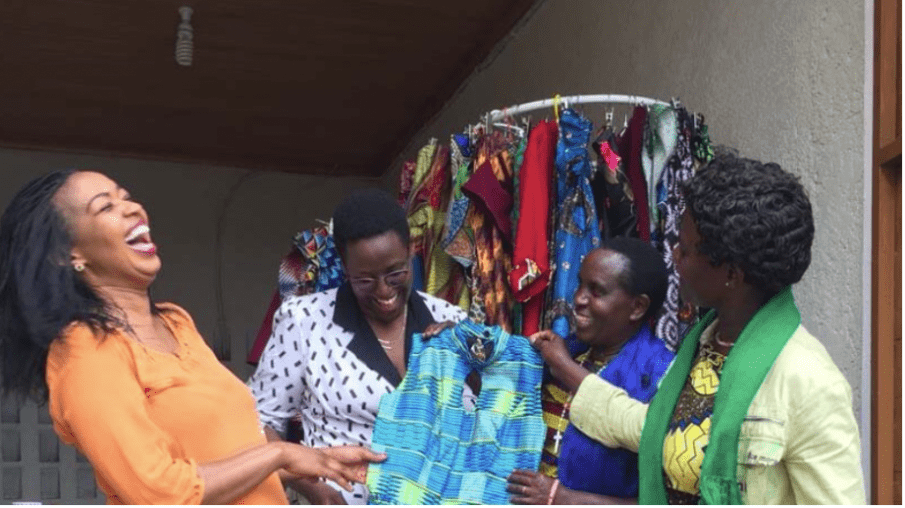Projects: Collaborate.Health
Providing girls and young women with sexual and reproductive health resources and education
A mobile application to provide girls and young women with sexual and reproductive health resources, education, and risk screening for sexual violence.
- Agency Partner
- Our Sisters Opportunity
- Course
- Using Mobile Technologies to Improve Health Outcomes

Overview
Our team partnered with the nonprofit organization Our Sisters’ Opportunity (OSO) based in Kigali, Rwanda. OSO was founded by Uwamahoro Delphine, who dedicates her work to provide girls and women in the community, with skills, tools, and resources to improve their household’s socio-economic status, self-reliance, and overall health and wellbeing.
Context
Our Sisters’ Opportunity currently has four programs: Creative Design College, Entrepreneurship Arena, Agri-Business, and School and Youth Health Initiatives. This includes enrolling the girls into a 6-month training program on high-end fashion with digital illustration design, shoemaking, and entrepreneurship. Furthermore, the girls and women learn leadership skills, permaculture design, life skills, and health education. The School and Youth Health Initiatives program has identified a particular need for adolescent sexual and reproductive health education, and our team hopes to address this need with the development of our mobile application.
In the community, there is a lack of knowledge about sexual and reproductive health, as well as awareness of medical and legal support systems to address disadvantaged families and significant family problems, including but not limited to: sexual harassment, sexual violence, and unintended pregnancy. There are also many cultural barriers in discussing and resolving these types of problems. Therefore, the goal for our team is to create a mobile application that OSO can use to provide girls and young women with sexual and reproductive health resources, education, and risk screening for sexual violence. We also want to ensure that the application could collect data for future development and expansion of the program.
Challenge
In the northern province of Rwanda, where OSO is located, not everyone has access to mobile devices, reliable internet, and/or electricity. One challenge in creating this application is that not all students in the School and Youth Health Initiatives program have access to a mobile device or internet connection. However, mobile interventions for health education and communications are becoming increasingly popular globally and specific indicators in Rwanda have shown the application’s potential for success. The Rwandan Ministry of Health has successfully implemented mobile health interventions to monitor and treat disease, as well as to increase health literacy. Delphine of OSO has informed our team that approximately 50% of the young women and girls in the program have access to a mobile device. The remaining 50% will borrow devices from staff members.
The main challenges this application hopes to address include a lack of knowledge relating to sexual and reproductive health, partially due to the perception of the topics seen as taboo or inappropriate. Many young women in this community dropout of school due to early pregnancy and have little economic means to care for themselves and their children. Some young women resort to unsafe methods of abortion that poses a grave risk to the woman’s health and by extension, to the wellbeing of families and society. Therefore, this application serves as primary prevention for many critical sexual reproductive health issues. Additionally, the application intends to provide resources and support for individuals who have experienced sexual violence or intimate partner violence. It has been imperative in the design process that the application be created to maintain a sense of privacy and security for users due to the sensitivity of certain topics.
Solution
In our partnership with OSO, we have developed an application consisting of an educational module, with a pre- and post-test to gauge changes in knowledge and skills following the educational information. The application also contains a monthly risk screening form, where students will answer questions to assess their risk of danger or intimate partner violence. Subsequently, high-risk students will be connected to a variety of resources and the opportunity to engage with OSO staff for further support if they so choose. New users register with a username and password to keep their accounts secure and to complete the monthly risk assessment and an educational refresher.
Results
We hope that this application will increase the sexual and reproductive health knowledge and skills of girls and young women at OSO and connect those who are experiencing violence, or who are at risk of experiencing violence, with the necessary resources and support. Projecting into the future, this could result in a reduction in STI cases, early age pregnancies, and sexual violence.
We are so grateful for this opportunity to partner with Our Sisters’ Opportunity and hope to see the success of this application in improving the lives of girls and young women
Project Timeline
This project took six months to complete from kick-off meeting to presentation of final deliverables. Click the button below for a detailed timeline.
View Project TimelineThe OSO Project Team
Lydia Cunningham, Gladys Obenewa, Katrina Barry,
Iyssa Otto and Adam Majeski